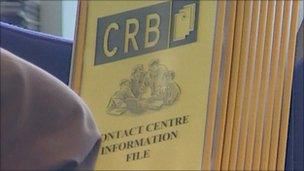Call for criminal records law change
- Published

CRB checks show current and spent convictions, cautions and reprimands
Civil liberties campaigners have welcomed reports that Britain's top judge is to call for the law on criminal records to be changed.
Currently job applicants are obliged to disclose all criminal convictions, no matter how old or irrelevant.
But the Master of the Rolls, Lord Dyson, is due to give a landmark ruling next week.
He told a Court of Appeal hearing the government should "pull its finger out" in changing the law.
The case at the heart of of a 21-year-old man - identified only as T - who was forced to disclose when he applied for a part-time job at a football club that he had received warnings from Greater Manchester Police for stealing two bicycles when he was 11.
They spoke out ahead of a court ruling expected next week that they said would declare the laws in breach of human rights.
Liberty said Master of the Rolls Lord Dyson told a Court of Appeal hearing that the Government should "pull its finger out" in changing blanket provisions in the Criminal Records Bureau system.
It said the court had concluded that automatic disclosure of all convictions and cautions - whether or not relevant to the job being applied for - was incompatible with Article 8 of the Human Rights Act - the right to a private and family life.
A draft judgment had been drawn up in December but not published while the Home Office discussed concerns with the court about the implications for the CRB system, it said.
Its legal officer Corinna Ferguson said: "The overzealous CRB system has allowed old, minor and unreliable information to wreck the lives of too many hardworking people in the UK.
"The Government can't put off dealing with this any longer. We look forward to seeing urgent proposals for a proportionate system that properly balances the aim of public protection with privacy rights."
A Home Office spokeswoman said: "The Court of Appeal has yet to make a ruling. We will respond when it does."
- Published7 January 2011
- Published8 July 2010